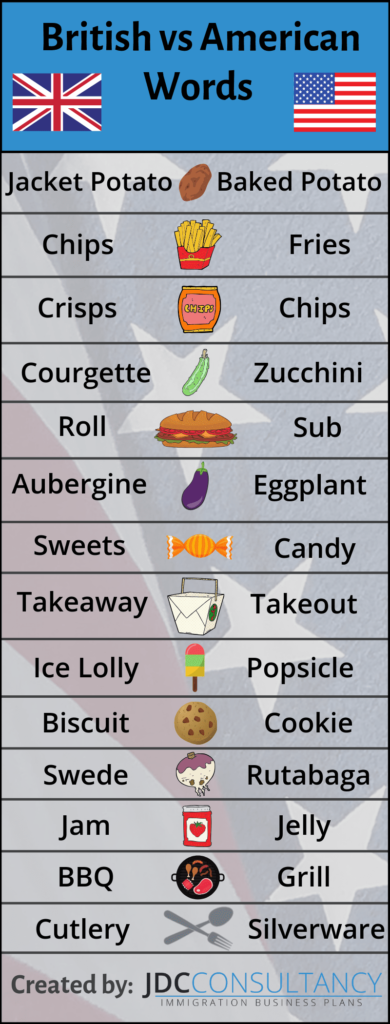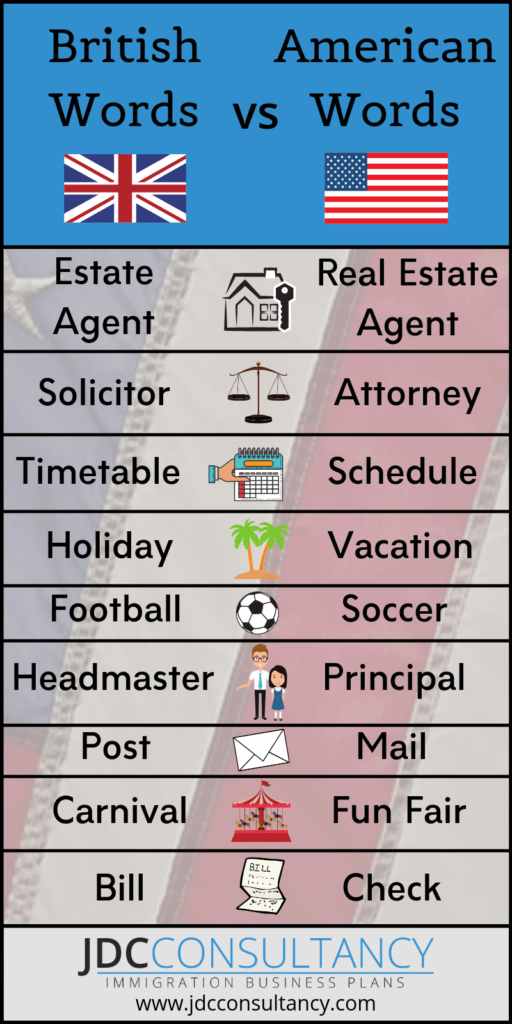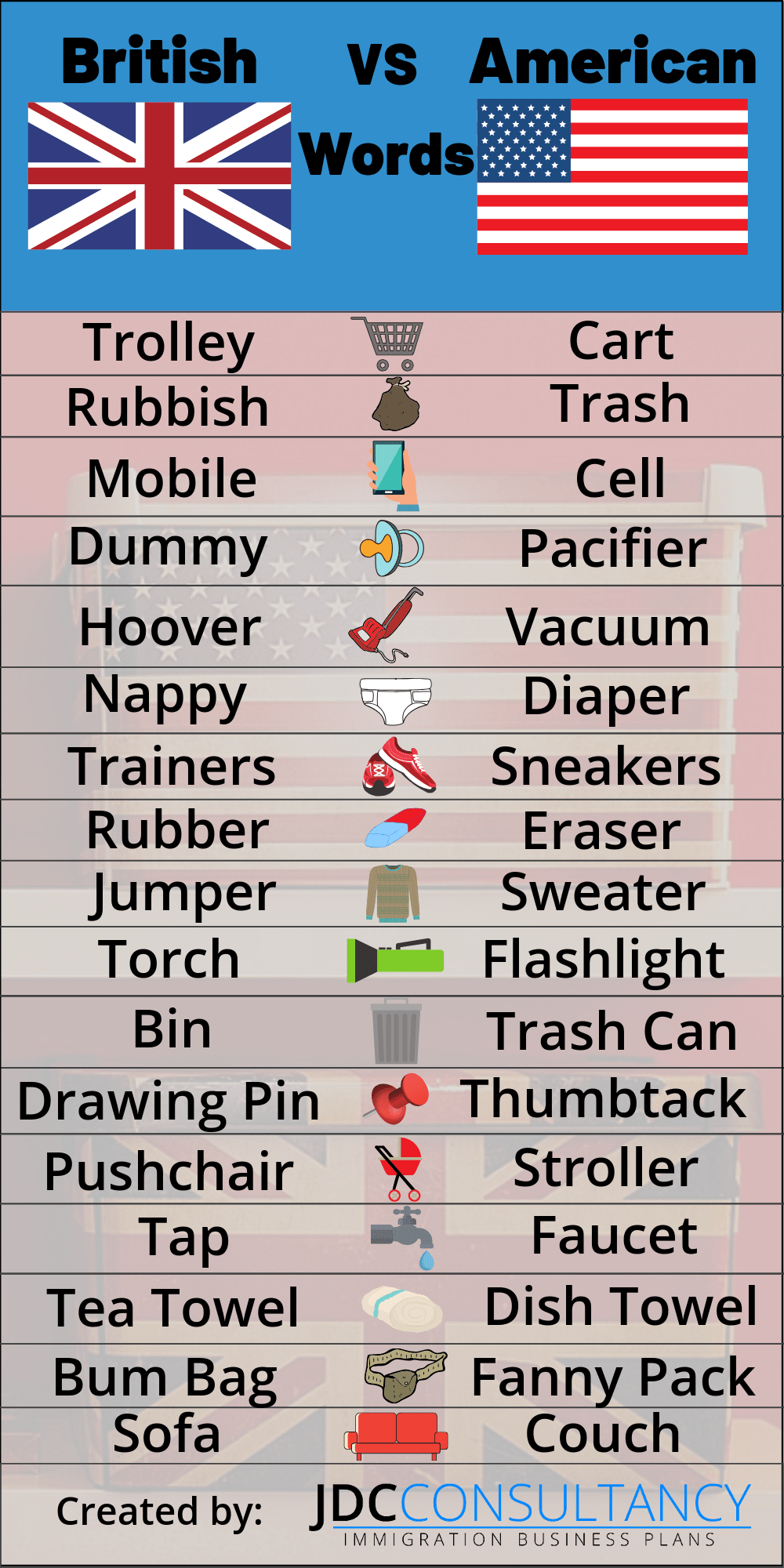Moving to a country where your native language is spoken seems like a safe bet at first glance. Sure, there might be regional slang and some quirky vernacular, but English is English, right? The truth is, the differences between British vs American English can crop up in unexpected places. For many British immigrants moving to the US, the differences in common words and phrases can prove to be an  unforeseen challenge and, sometimes, a frustrating obstacle.
unforeseen challenge and, sometimes, a frustrating obstacle.
British English vs American English Words
While an American strapping on their “fanny pack” is sure to raise some British eyebrows, An American might scratch their heads when someone complains about dodging “lorries” on the “motorway”. Exposure to American films and television, as well as the social media boom that makes exposure to other cultures part of daily life for most younger Brits, gives most UK immigrants an idea of what to expect in the United States, but some common US words and phrases might seem obscure, confusing, or even outright silly to those who were raised speaking British English.
Cooking Confusion: Food Terms in the US vs the UK
For example, during their first trip to a US grocery store, British immigrants will find themselves faced with familiar items and products with unfamiliar names. If they ask a clerk for an aubergine, coriander, or a courgette, they might be met with a blank stare, but if they point them out on the shelf, the clerk will immediately recognize eggplants, cilantro, and zucchini. If they browse the aisles for biscuits, they’ll end up with buttery scones that aren’t quite so easy to dunk in their tea, and a search for prawns might turn up more than one kind of crustacean. After a meal, a Brit might “do the washing-up,” while an American would just “do the dishes.”
Cooking and shopping using recipes in American English might be challenging at first, but after some cross-referencing and maybe a few quick Google searches in the store, most Brits won’t have much trouble adjusting their grocery lists to match the labels on US shelves.
Pants or Trousers? British vs American Clothing Terms
Shopping for clothes, especially online, can be a headache for those having to choose between British vs American words. Searching for a sleeveless “vest” online is likely to pull up pages and pages of waistcoats, while a search for a “house coat” or “dressing gown” will almost exclusively result in listings for bathrobes. For a British fitness enthusiast, it might make very little sense that their multi-purpose “trainers” are narrowed down to being called just “tennis shoes” in the US. “Trousers” sounds terribly old-fashioned to an American English speaker but telling a British English speaker you forgot to pack “pants” for your trip will have them wondering how you could forget to bring your underwear.
Moving Right Along: British Words vs American Words (on the road)
 Learning to drive on the opposite side of the road is difficult enough, but British motorists in the US must also acquaint themselves with the unfamiliar car and driving terms. In the US, what they call a “boot” is a “trunk,” a “bonnet” is a “hood,” “lorries” are “semis” or just “trucks,” and the aforementioned “motorway” is a “highway,” “freeway,” or “interstate.” Drivers in the US use their “blinkers,” not their “indicators” before turning, and fuel up at stations pumping “gas,” not “petrol.” Although context makes the meanings of these words relatively clear, British drivers might find they take some getting used to.
Learning to drive on the opposite side of the road is difficult enough, but British motorists in the US must also acquaint themselves with the unfamiliar car and driving terms. In the US, what they call a “boot” is a “trunk,” a “bonnet” is a “hood,” “lorries” are “semis” or just “trucks,” and the aforementioned “motorway” is a “highway,” “freeway,” or “interstate.” Drivers in the US use their “blinkers,” not their “indicators” before turning, and fuel up at stations pumping “gas,” not “petrol.” Although context makes the meanings of these words relatively clear, British drivers might find they take some getting used to.
Webster’s New Words: Why the US and UK Spell So Differently
The spelling differences between US and UK English don’t do anyone any favors (favours) when trying to fit into a new culture. Brits often joke that American English is just English: simplified, and in many cases, they’re right. US English is overall more phonetic than British English by design. In the 1800s American lexicographer Noah Webster decided the US should express its independence from the UK through language reform. He changed words like “centre” and “theatre” to “center” and “theater,” and dropped the letter “U” in color (colour), favor (favour), endeavor (endeavour), and countless other words. This new version of English adopted the suffix “ize” to replace the British “ise” in words like “organize,” “realize,” and “colonize,” and words like “axe” and “catalogue” lost their final letters, becoming “ax” and “catalog.”
Webster’s condensed, simplified version of English in his book, The Elementary Spelling Book, was the standard for teaching Americans to write for over a century, and permanently changed how the US spells English words. Whether typing up an essay for university (called college, in the US), an email for work, or just a text message to a friend, British immigrants to the US must, perhaps ironically, conform to the “new” English and be mindful of their audience and adapt the way they spell words almost constantly.
British Words vs American Words
Although adjusting to unfamiliar words for familiar objects and learning which words are spelled differently in the US can seem daunting at first, British and American English are more similar than different. Both nations share much of the same media, including films, music, and television, which bridges many gaps in translation, blends local slang and is steadily homogenizing (or homogenising) the English language across borders. With a little practice, and maybe some trial and error, British immigrants in the US can learn the differences quickly and adapt seamlessly to their new home.


